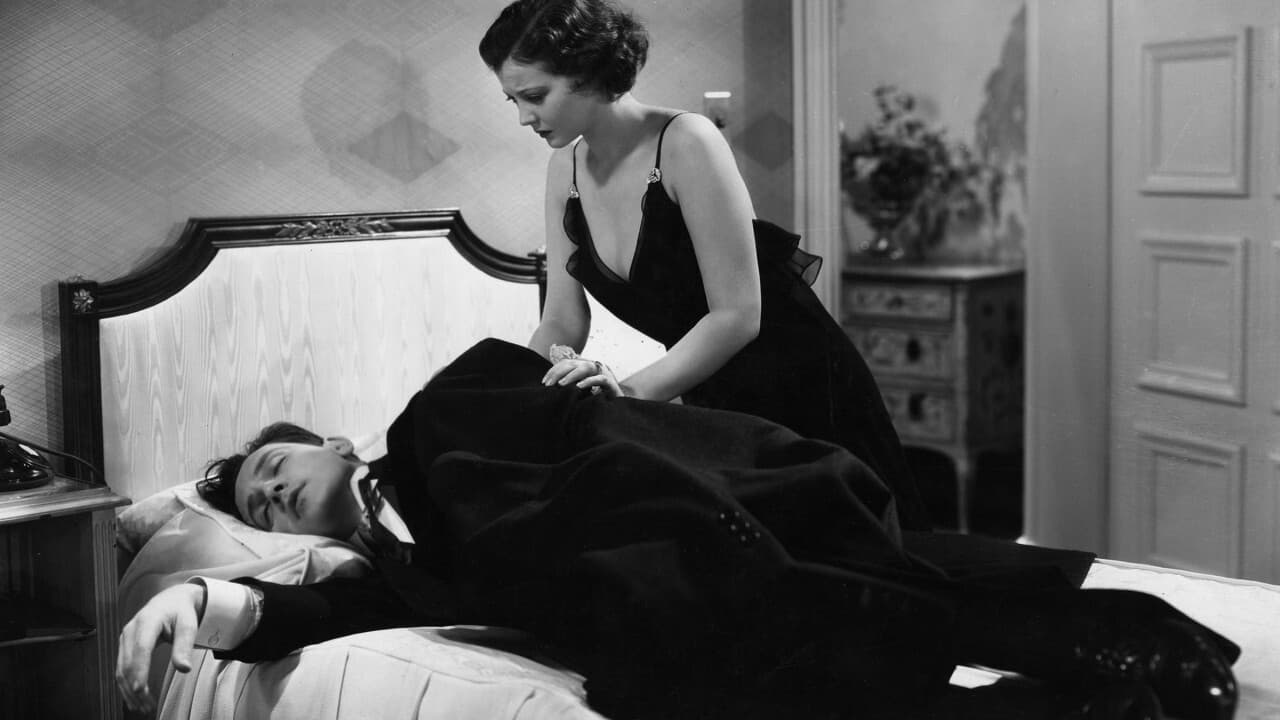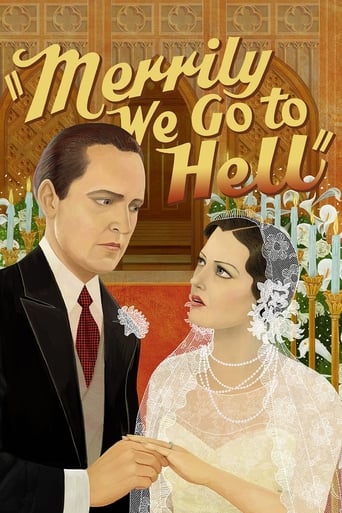



Surprisingly incoherent and boring
Absolutely Fantastic
The movie's not perfect, but it sticks the landing of its message. It was engaging - thrilling at times - and I personally thought it was a great time.
View MoreExcellent and certainly provocative... If nothing else, the film is a real conversation starter.
View MoreClever dialogue, fantastic acting, and several great scenes made this film a delight for me, but be forewarned, its main character may have you saying 'grrr', and reduce your enjoyment. Frederic March plays a newspaper reporter / playwright who has a drinking problem, and it's while he's drunk at a party that he meets a charming young lady, played by Sylvia Sidney. The two hit it off and despite the concerns of her rich father (George Irving), get married. Things get complicated when his ex-lover (Adrianne Allen) re-surfaces and he struggles to control his problem.It's a very strong cast all around, and Sidney in particular turns in a great performance. She ranges from a sweet, naïve, and trusting soul, loving unconditionally, to hurt and confused, to woman whose solution is to give her husband a taste of his own medicine, in a rather shocking development. The scene with her partying with her own young lover (Cary Grant no less) and his friends and quipping "Gentlemen, I give you the holy state of matrimony, modern style: single lives, twin beds and triple bromides in the morning" is sad, empowering, and a little thrilling all at the same time. As they're in a bar that's practically a den of iniquity, it's all clearly pre-code, but there is an intelligence and honesty in this scene, and throughout the movie.March is also strong as this affable but flawed man, and in early scenes we smile at his partying, at one point yelling "Is there a baritone in the house?" until he finds a barman to fill out a quartet with his friends so that they can break out in song. The warning signs are there in his tardiness and even at his wedding, as he and his best man (Skeets Gallagher) fumble for the ring, which he's forgotten. That scene is one of several that are well directed by Dorothy Arzner, as she cuts to guests making observations and the facial reactions of March and Sidney as they say their vows.There is a lot of partying and revelry which may put some viewers off, but I found that allowed for some fantastic moments. In one, March asks Sidney to shut the door and hold him back from going to the other woman, and in a strong way she opens it wide and says "I'm no jailer - get out!" In another, as March and Allen 'play-act' a passionate kiss to the merriment of others right in front of her, we feel the shock and humiliation amplified by her brilliant facial reaction. The title is clearly meant to titillate, but the film has real substance beneath. It's wild, but also realistic, though I didn't care too much for the ending. We see what destructive behavior leads to, and in that I suppose there is a message, but it's delivered without heavy-handed moralizing. The plot is a tad melodramatic, but it's daring and unique in the areas it explores. Well worth checking out, if you're in the mood for pre-code.
View MoreFrederick March and Sylvia Sidney star in "Merrily We Go to Hell," from 1932.For those of us who only remember Sylvia Sidney as an older character actress -- and usually a pretty mouthy one at that -- seeing her as an ingénue is always a revelation.Jerry Corbett (March) is a reporter and a drunk, still pining for the woman who broke his heart, Claire (Adrienne Allen). When he meets the lovely Joan Prentice (Sidney) from a wealthy family, the two fall for one another and marry.Jerry wants to write plays, and he eventually is able to have one produced, early in the marriage. Unfortunately, one of the stars is Claire, and she's perfectly willing to take up where they left off. Jerry starts drinking again. Joan is heartbroken as well as hurt and starts drinking and partying herself. Finally, though, she returns to her father's home.Nothing too surprising in the plot, but good performances all around. Sidney is pretty and vulnerable, taking a chance on a man her father disapproves of but whom she loves. March shows that Jerry is a weak man who in his heart doesn't believe he deserves the happiness he's had with Joan. Can these two find their way back to one another? Just guess.Dorothy Arzner had a good sense of pacing, so the film doesn't drag or slow down. Worth seeing for the actors, not necessarily the story.
View MoreFunny drunks aren't realistic drunks, and until Billy Wilder created a great part for Ray Milland, alcoholism was rarely treated seriously. Fredric March is a struggling playwright, favorite of the party scene who hasn't hit the big time. He falls in love with wealthy socialite Sylvia Sidney whose domineering father (George Irving) despises March and does everything in his power to dissuade her from marrying him. But they do, success follows for March, and his illness leads to degradation and tragedy. To teach her husband a lesson, in the meantime, Sidney becomes a party girl herself, flaunts her own discretions (with a young Cary Grant, playing one of the actors in the play), hoping he'll leave his current fling (the play's leading lady, Adrienne Allen) and come back to his senses.These characters are all presented as worthless bon vivants, even the successful theater people, and March's comical sidekick (Richard "Skeets" Gallagher). The title is March's toast every time he takes a drink, and a metaphor for the dead lives that the characters are leading. This leads to a real downer of a story, shocking in its choice of pre-code sins, a party sequence which is almost an orgy in its set-up with sultry music and dialog. Irving's father is truly a nasty character with no motivation other than total control and possessional of his only child for acting as he does. The Paramount pre-code look is lavish, but it is basically "Dante's Inferno" without the end result of that classic poem's destination.
View More***SPOILERS*** ***SPOILERS*** MERRILY WE GO TO HELL (Paramount, 1932), directed by Dorothy Arzner, is not a horror movie about Satan worshipers who hold Black Masses in Transylvania, as the title may indicate, but is a story about an heiress names Joan Prentiss (Sylvia Sidney) who meets Jerry Corbett (Fredric March), a drunken newspaperman, on the rooftop during a party. Jerry's ambition is to become a successful playwright. Within a short time he falls in love with Joan, but Joan's father (George Irving) disapproves of Jerry because of his careless ways. He offers to buy Jerry out of marrying his daughter, but refuses to accept the $50,000. Quite happy that Jerry's sole interest is in his daughter, he gleefully approves of the upcoming marriage. During the wedding ceremony, Jerry, somewhat drunk, forgets the wedding ring and finds himself in an embarrassing situation by placing a beer tap on Joan's finger. Time passes. Jerry writes the comedy play, "When Women Say No," and it gets produced. The leading lady turns out to be Claire Hempstead (Adrienne Ames), Jerry's former girlfriend. While the play proves successful, Jerry's married life is not, especially when Joan finds he's spending more time with Claire as well with the booze. Not wanting to be an old-fashioned wife, Joan decides not to let this bother her by dating Charlie Baxter (Cary Grant), the leading man of the play, to society functions. Disgusted, Joan finally does leaves Jerry without telling him she's pregnant with his child. Old Man Prentiss tries his best to keep Jerry from visiting Joan in the hospital, where she's in danger of possibly losing either her life or baby.The title, MERRILY WE GO TO HELL, happens to be the catch phrase used by March several times in the story before taking a drink. The movie in itself is forgotten with a familiar plot quite common during the Depression era. Film titles using "Hell" in it were also quite common practice during that time, until the production code people stepped in and put a stop to that, for the time being anyway. This romancer may be of some interest to film buffs today, especially seeing it being an early screen appearance by Cary Grant, in his third featured role. He is first seen (in long shot) wearing period costume and wig in Jerry's stage play opposite Adrienne Ames, and later at a social function in dinner clothes after the play's opening, before his character disappears. Sylvia Sidney does what she does best playing a long suffering girl, a kind of role she played from time to time, possibly because of her sweet and tender face. Before the end of 1932, Grant would elevate to becoming Sidney's co-star in one of her most tender movie roles, MADAME BUTTERFLY.Also featured the cast of MERRILY WE GO TO HELL is Richard "Skeets" Gallagher as Buck, Jerry's reporter friend with a talent for tap-dancing, adding some amusing support during the film's serious moments; Kent Taylor as Gregory; and Florence Britton as Charlcie. Background music score includes "What a Little Thing Like a Wedding Ring Can Do" and "We Will Always Be Sweethearts," songs introduced in Paramount's 1932 musical hit, ONE HOUR WITH YOU starring Maurice Chevalier and Jeanette MacDonald.In spite of good actors rising above somewhat average script, it's worth seeing as a curiosity on DVD(double featured with 1931's THE CHEAT). If the story may not be an attention grabber, the title definitely is. (**)
View More